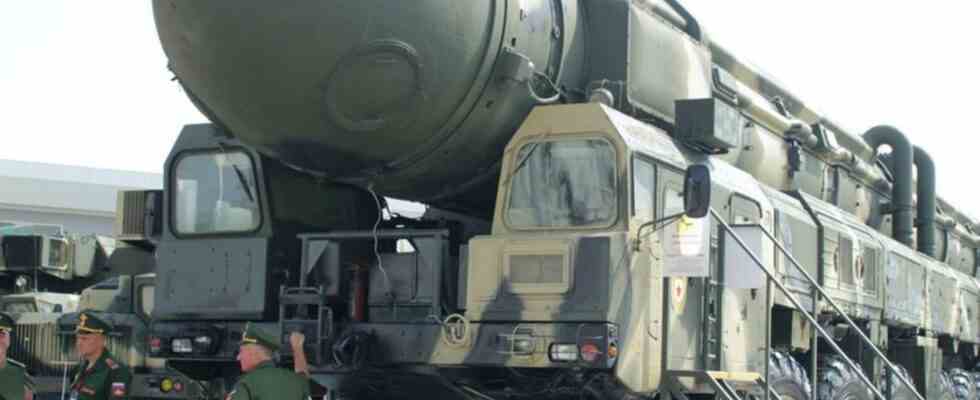armor
Conference warns against belief in nuclear weapons
A Topol ICBM capable of being armed with nuclear warheads in Moscow. Photo: YNA/dpa
© dpa-infocom GmbH
The use of nuclear weapons was previously considered taboo. The possible use of tactical nuclear weapons was recently discussed in the Ukraine war. Experts warn of unforeseeable consequences.
More than 90 million people would be killed or injured in the first few hours of a nuclear war between Russia and the US, according to researchers at Princeton University in the US. That would be the extremely bloody beginning of the spiral of nuclear violence.
At a conference in Vienna, experts warned of the consequences of using nuclear weapons well below the level of a global conflict. “The destructive power of even a small atomic bomb is one hundred times that of the currently largest conventional bomb,” said Moritz Kütt from the Hamburg Institute for Peace and Security Policy.
13,000 nuclear warheads are stored in the depots
The common concern of many participants: Nuclear weapon states could meanwhile want to use their arsenal in the mistaken belief that the consequences can be controlled. That’s huge. 13,000 nuclear warheads are stored in the depots, 10,000 of which are probably ready for immediate use, most of them in the hands of the USA and Russia.
The fireball, the blast, the radiation – instantly deadly for some, combined with years of suffering from injuries and illnesses for others. Caring for the injured would likely collapse any healthcare system, said an International Red Cross (ICRC) expert. No clean drinking water, not enough blood donations, many hospitals destroyed: The scenario would in any case resemble the catastrophic situation in Hiroshima and Nagasaki, which became the targets of a US nuclear attack in 1945.
Researchers are convinced that the fact that no more atomic bombs have been detonated since then – apart from around 2,000 tests worldwide – is not solely due to mutual deterrence among the nuclear powers. “We were just lucky,” said Patricia Lewis, conflict researcher at British think tank Chatham House.
She recalled the cases in the past few decades in which people in dire straits to make a decision did not set the course for the use of nuclear weapons, but against it. Among other things, the case of Stanislav Petrov became known. In 1983, the Soviet colonel ignored a computer analysis that the US had detonated several ICBMs. He decided: False alarm – and thereby probably prevented a nuclear inferno.
“Nuclear weapons do not ensure security”
For the skeptics of the principle of nuclear deterrence, it is high time that the world started to rethink. “The logic that nuclear weapons ensure security is a fundamental error,” said Austria’s Foreign Minister Alexander Schallenberg at the start of the conference. Deterrence requires credibility, which in turn rests on the willingness to use these weapons. It’s a fine line, the world is constantly dancing on the edge of the abyss, according to the message of many speakers. Austria’s disarmament expert and diplomat Alexander Kmentt referred to the doomsday clock. This risk display, which is continuously calibrated by US experts – it was made before the Ukraine war – is at 100 seconds before twelve. This is the shortest span in their history.
Regional conflicts would also have global effects. A war between India and Pakistan with around 50 nuclear weapons detonated each would produce a lot of smoke. The US climate researcher Michael Mills said it would migrate around the world at high altitudes, darken the sun and significantly reduce temperatures and precipitation. The estimated 150 million tons of smoke from a war between Russia and the US with thousands of nuclear warheads would lead to darkness instead of sunlight and permanent freezing in parts of the US and Europe for years to come. Nuclear winter would be real.
The expert conference took place immediately before the first meeting of around 80 countries that have signed the Treaty on the Prohibition of Nuclear Weapons (TPNW). From Tuesday to Thursday, these states want to promote their nuclear weapons-free path in Vienna. According to the Stockholm peace research institute Sipri, the USA, Russia, Great Britain, France, China, India, Pakistan, Israel and North Korea currently have nuclear weapons. The Non-Proliferation Treaty (NPT) seems to cement their monopoly. The TPNW, on the other hand, wants to achieve a comprehensive ban. “There are no right hands for the wrong guns,” Kmentt recalls a statement by ex-UN Secretary General Kofi Annan.

